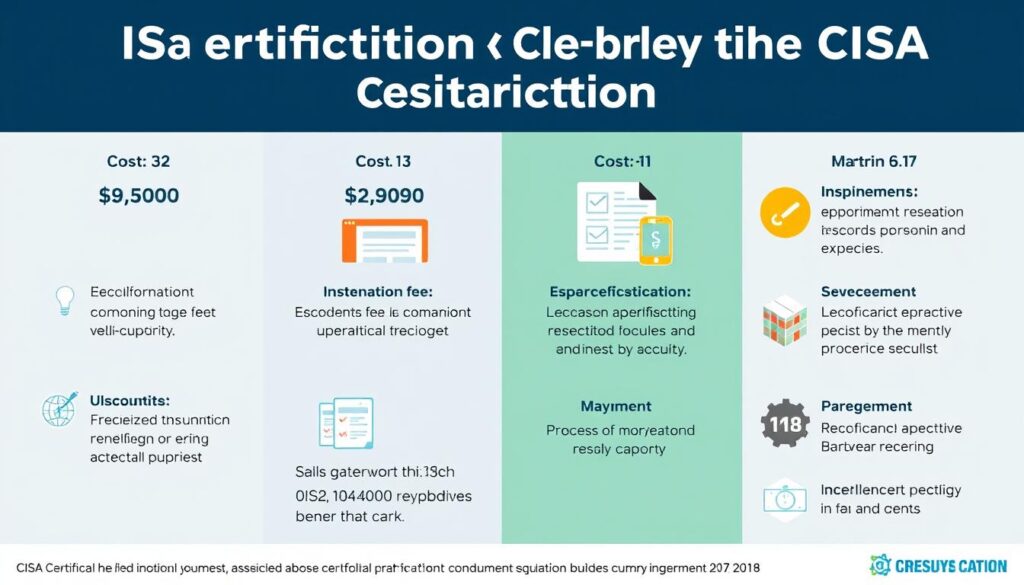In today’s rapidly evolving cybersecurity landscape, the importance of having certified professionals who can safeguard information systems cannot be overstated. The global average cost of a data breach has reached $4.45 million, a 15% increase over three years, according to IBM. This staggering figure highlights the growing demand for experts in IT auditing and security.
Obtaining a Certified Information Systems Auditor (CISA) designation can be a game-changer for your career. Conferred by the Information Systems Audit and Control Association (ISACA), CISA certification is recognized globally as a standard for professionals in information systems auditing, control, and security.
As you consider advancing your career in IT audit, understanding the costs associated with CISA certification is crucial. This includes not just the exam fee, but also study materials, membership fees, and ongoing maintenance costs.
Key Takeaways
- Understanding the complete cost structure of CISA certification is vital for career planning.
- CISA certification offers significant returns through enhanced career opportunities and salary potential.
- The demand for CISA-certified professionals is on the rise due to increasing cybersecurity threats.
- CISA certification provides a competitive edge in the job market.
- Investing in CISA certification can lead to professional credibility in the cybersecurity landscape.
Understanding the CISA Certification
For IT professionals looking to demonstrate their expertise in information systems audit, control, and security, the CISA certification is a valuable asset. This certification is highly regarded in the industry and is a significant credential for those working in IT governance and security.
What is CISA and Why It Matters
The CISA certification is designed for professionals who audit, control, and secure information systems. It is a benchmark of expertise in the field, demonstrating your ability to manage and assess an organization’s IT and security practices. By obtaining this certification, you show your commitment to maintaining high standards in information security and governance.
The CISA certification is particularly important in today’s digital landscape, where security threats are increasingly common. It signifies that you have the knowledge and skills necessary to protect an organization’s information assets and ensure the integrity of their IT systems.
ISACA: The Organization Behind CISA
ISACA (Information Systems Audit and Control Association) is the organization behind the CISA certification. Founded in 1969, ISACA has evolved into a global leader in IT governance, providing resources, training, and certifications to IT professionals worldwide. The organization developed the CISA certification in 1978 in response to the growing need for standardized IT security practices and auditing methodologies.
ISACA maintains rigorous standards for all its certifications, which is why ISACA credentials like CISA are highly respected and trusted by employers across industries. By earning a CISA certification through ISACA, you join a community of over 150,000 professionals dedicated to maintaining high standards in information systems security and governance.
- ISACA continually updates its certification programs to reflect current industry practices and emerging technologies.
- The organization offers numerous resources to support certification candidates and certified professionals.
- These resources include study materials, professional development opportunities, and networking events.
CISA Certification Cost Breakdown

As you consider obtaining your CISA certification, it’s vital to understand the various costs involved. The CISA certification is a significant investment for your career in IT audit, control, and security.
Exam Registration Fees for Members vs. Non-Members
The cost of registering for the CISA exam differs significantly for ISACA members versus non-members. Members enjoy a discounted rate, making membership a valuable consideration for those planning to take the exam.
ISACA members pay a lower exam registration fee compared to non-members, which can be a significant cost savings. This difference highlights the benefits of becoming an ISACA member before registering for the exam.
ISACA Membership Costs and Benefits
Becoming an ISACA member can offer several benefits, including reduced exam fees, access to exclusive resources, and opportunities for networking within the IT audit and security community.
The cost of ISACA membership should be factored into your overall budget for CISA certification. However, the benefits often outweigh the costs, especially for those who plan to pursue other ISACA certifications or stay updated with the latest developments in the field.
Study Materials and Preparation Resources
Preparing for the CISA exam requires a significant investment in study materials and potentially, preparation courses. Candidates can choose from a variety of study resources, including ISACA’s official review materials, online courses, and study groups.
The cost of these resources can vary widely. It’s essential to research and select the materials that best fit your learning style and budget.
Hidden Costs to Consider
Beyond the obvious costs like exam fees and study materials, there are several “hidden” expenses to consider. These include:
- Annual certification maintenance fees, which are around $45 for ISACA members and $85 for non-members.
- Continuing Professional Education (CPE) requirements, which can cost anywhere from free to several thousand dollars depending on how you fulfill them.
- Time investment, as most candidates spend 3-6 months studying for the exam.
- Travel expenses to a testing center, if not available locally.
- Technology requirements for remote proctoring, which may necessitate upgrading your computer or internet connection.
Understanding these costs upfront can help you plan more effectively for your CISA certification journey.
CISA Certification Requirements
Understanding the CISA certification requirements is crucial for your application process. To become a certified information systems auditor, you must meet specific eligibility criteria set by ISACA.
Education and Experience Prerequisites
The CISA certification is designed for professionals with a background in information systems auditing, control, or security. To be eligible, you need to have a minimum of five years of experience in the field, although some substitutions can be made for education and other relevant experience. The experience should be directly related to the five domains of the CISA exam: information systems auditing, governance and management of IT, information systems acquisition, development, and implementation, information systems operations, maintenance, and support, and protection of information assets.
You can substitute up to two years of experience with a relevant degree or other professional certifications. This flexibility allows candidates to demonstrate their expertise and commitment to the field, even if they don’t have the full five years of experience.
Application Process and Timeline
The CISA certification application process begins with registering for and passing the CISA exam. After passing the exam, you have five years to apply for certification by submitting your experience verification through ISACA’s online certification application system. The application requires detailed documentation of your professional experience, including specific job duties related to information systems auditing and control.
Each experience entry must be verified by a supervisor or manager who can confirm your work responsibilities and duration in roles relevant to CISA domains. ISACA typically takes 4-8 weeks to review and process certification applications, though this timeline can vary based on application volume and completeness of documentation.
- Register for and pass the CISA exam.
- Submit your experience verification within five years.
- Ensure your application is complete and accurate.
- Agree to adhere to ISACA’s Code of Professional Ethics.
Once your application is approved, you’ll receive official notification of your CISA certification status, and your name will be added to ISACA’s certification registry. The entire process from exam registration to certification approval can take anywhere from several months to a few years, depending on your existing experience and how quickly you complete each step.
CISA Exam Structure and Content
Understanding the structure and content of the CISA exam is crucial for your preparation. The CISA exam is a comprehensive assessment that tests your knowledge and skills in IT auditing and security. As you prepare for the CISA certification, it’s essential to familiarize yourself with the exam’s format and content.
The Five Domains of the CISA Exam
The CISA exam is divided into five domains, each focusing on a specific area of IT auditing and security. These domains are:
- Domain 1: Auditing Information Systems
- Domain 2: Governance and Management of IT
- Domain 3: Information Systems Acquisition, Development, and Implementation
- Domain 4: Information Systems Operations and Business Resilience
- Domain 5: Protecting Information Assets
Each domain tests your knowledge and application of concepts related to information systems auditing and security. The exam questions are designed to simulate real-world scenarios, requiring you to apply your knowledge to practical situations.
Exam Format and Scoring System
The CISA exam consists of 150 multiple-choice questions that must be completed within a four-hour timeframe. Each question has four possible answers, and there’s no penalty for incorrect answers. The exam uses a scaled scoring system, ranging from 200 to 800, with 450 being the minimum passing score. The exam results are typically available immediately upon completion.
The CISA exam is now computer-based, allowing you to schedule it online at authorized testing centers or through remote proctoring options. This flexibility makes it easier for candidates to take the exam from various locations. To succeed, you need to manage your time effectively and answer all questions to the best of your ability.
Preparing for the CISA Exam

Effective preparation is crucial for achieving success in the CISA certification exam. To help you prepare, it’s essential to understand the various study methods and resources available.
Self-Study vs. Training Bootcamps
When it comes to preparing for the CISA exam, you have two primary options: self-study and training bootcamps. Self-study involves using study materials like the official ISACA CISA Review Manual and practice questions to prepare at your own pace. On the other hand, training bootcamps offer structured learning with instructor guidance.
Self-study is ideal for those who are disciplined and prefer learning independently. However, training bootcamps can provide valuable insights and support, especially for complex topics.
Recommended Study Strategies and Resources
To maximize your chances of success, consider the following study strategies:
- Create a structured study plan that allocates more time to heavily-weighted domains.
- Use the official ISACA CISA Review Manual and supplement it with the Questions, Answers, and Explanations (QAE) database.
- Implement active learning techniques such as creating flashcards or making mind maps.
- Join study groups or online forums to benefit from diverse perspectives.
- Utilize the 50/50 rule: spend half your time reviewing content and half practicing questions.
By combining these strategies with the right study materials, you can effectively prepare for the CISA exam and enhance your knowledge and skills.
Additionally, consider taking full-length practice exams under timed conditions to build stamina and identify knowledge gaps. Creating a glossary of key terms can also help reinforce your understanding of critical concepts.
CISA Certification Renewal and Maintenance
Once you’ve obtained your CISA certification, it’s essential to understand the renewal and maintenance requirements to keep your certification active and in good standing. Maintaining your CISA certification involves several key steps, including fulfilling Continuing Professional Education (CPE) requirements and paying annual maintenance fees.
Continuing Professional Education (CPE) Requirements
As a CISA-certified professional, you’re required to complete a certain number of CPE hours to maintain your certification. This requirement ensures that you stay updated with the latest developments and advancements in the field of IT audit and security. Tracking your CPE activities is crucial; ISACA expects you to keep records of your CPE hours, which can be as simple as saving certificates or tracking hours in a spreadsheet.
- Complete 20 CPE hours per year, with a minimum of 120 hours over a 3-year cycle.
- Report your CPE hours through ISACA’s online portal during the renewal process.
- Ensure that your CPE activities are relevant to the IT audit and security field.
Annual Maintenance Fees and Renewal Process
In addition to CPE requirements, you’ll need to pay an annual maintenance fee to keep your CISA certification active. The fee is currently $45 for ISACA members and $85 for non-members, and it must be paid by January 15th each year. The renewal process is managed through ISACA’s online portal, where you’ll report your CPE hours and pay your maintenance fee.
To avoid any lapses in your certification status, it’s recommended that you:
- Set up automatic payments or calendar reminders for your maintenance fee.
- Regularly review your CPE hours to ensure you’re meeting the requirements.
- Check with your organization’s HR department about potential reimbursement for certification maintenance fees.
By staying on top of your CPE requirements and maintenance fees, you can maintain your CISA certification without interruption and continue to benefit from the professional credibility and career advancement opportunities it provides.
Return on Investment: Is CISA Worth the Cost?
When considering the CISA certification, one of the primary concerns is whether the investment is worth the cost. The CISA certification is a significant undertaking that requires both financial investment and a considerable amount of time and effort. However, the benefits it offers can be substantial, impacting both your financial and professional growth in meaningful ways.
Short-Term vs. Long-Term Financial Benefits
The financial benefits of CISA certification can be viewed from both short-term and long-term perspectives. In the short term, the certification may not immediately translate into a significant salary increase. However, it can open doors to new job opportunities that may offer better compensation packages. CISA-certified professionals are in high demand, and this demand can drive up salary expectations.
In the long term, the financial benefits become more pronounced. CISA certification is associated with career advancement into higher-paying roles such as IT Audit Manager, Compliance Officer, or Security Analyst. These roles not only offer higher salaries but also provide a clearer path for future career progression and increased earning potential. The certification demonstrates your expertise and commitment to the field, making you a more attractive candidate for promotions and new opportunities.
Non-Financial Benefits of CISA Certification
Beyond the financial benefits, CISA certification offers numerous non-financial advantages that can significantly impact your career and professional development. One of the most significant benefits is the instant credibility it provides. By obtaining CISA certification, you signal to employers and clients that you possess a verified level of expertise in information systems auditing, which is recognized globally.
The certification also grants you access to an exclusive professional network of over 150,000 CISA-certified professionals worldwide. This network can be a valuable resource for knowledge sharing, career opportunities, and professional growth. Moreover, CISA-certified professionals often report increased confidence in their technical abilities and decision-making, allowing them to contribute more effectively to their organizations’ security posture.
- CISA certification provides a comprehensive framework for approaching information systems security challenges, improving your effectiveness in identifying and mitigating risks.
- Employers often prioritize CISA-certified professionals for leadership roles and high-visibility projects, providing greater job satisfaction and professional growth opportunities.
- The certification demonstrates your commitment to professional development and ethical standards, qualities highly valued in the information security industry.
In conclusion, while the initial cost of CISA certification may seem daunting, the long-term financial and non-financial benefits make it a worthwhile investment for IT professionals looking to advance their careers in IT audit and cybersecurity. The certification not only enhances your professional credibility and opens up new career opportunities but also equips you with the knowledge and skills necessary to excel in your field.
CISA Certification Salary Potential

CISA-certified professionals are in high demand, and their salary potential reflects the value they bring to organizations. As you explore the benefits of CISA certification, understanding the financial rewards is essential.
Average Salary by Experience Level
The salary for CISA-certified professionals can vary significantly based on experience. Generally, those with more years of experience in IT audit and related fields command higher salaries. Professionals with 5-10 years of experience can expect average salaries ranging from $80,000 to over $120,000 annually, depending on the industry and location.
Entry-level positions typically start around $60,000, while senior roles or those with over 15 years of experience can earn upwards of $150,000 or more. The additional skills and certifications, such as Security+ or CRISC, can further enhance earning potential.
Salary Variations by Industry and Location
Industry sector plays a crucial role in determining salary for CISA-certified professionals. The financial services industry offers the highest average salaries, with compensation packages typically 15-20% above the overall average due to stringent regulatory requirements.
Technology companies and consulting firms also offer competitive salaries to attract CISA-certified talent. Healthcare organizations have shown increasing demand due to HIPAA compliance requirements, with salaries growing at above-average rates.
Geographic location significantly impacts salary potential, with major technology hubs like San Francisco, New York, and Boston offering 20-30% higher compensation than the national average. International markets also show varying compensation levels, with countries like Switzerland, Australia, and Singapore offering attractive packages.
Career Opportunities with CISA Certification

The CISA certification paves the way for a successful career in IT auditing and security management. As a CISA-certified professional, you can expect to be in high demand across various industries, each with its unique IT challenges and regulatory requirements.
Top Job Roles for CISA-Certified Professionals
CISA certification opens up numerous career opportunities in IT audit and security. Some of the top job roles for CISA-certified professionals include:
- IT Audit Manager: Oversee IT audit functions and ensure compliance with regulatory requirements.
- Information Security Analyst: Implement and manage security measures to protect an organization’s data.
- Compliance Officer: Ensure that an organization adheres to relevant laws, regulations, and standards.
- Risk Management Specialist: Identify and mitigate risks to an organization’s information assets.
- IT Governance Specialist: Develop and implement IT governance frameworks to align IT with business objectives.
These roles are critical in today’s digital landscape, where data security and compliance are paramount. As a CISA-certified professional, you’ll have the skills and knowledge to excel in these positions.
Industries Seeking CISA Expertise
The demand for CISA-certified professionals spans a wide array of sectors. Some of the key industries seeking CISA expertise include:
Financial Services: Banks, investment firms, and insurance companies value CISA-certified professionals for their expertise in regulatory compliance and data protection.
Healthcare: With the increasing importance of patient data privacy, healthcare organizations are seeking CISA-certified professionals to secure their IT systems and comply with regulations like HIPAA.
Government and Public Sector: Government agencies need CISA-certified professionals to protect sensitive information and ensure compliance with regulations like FISMA.
Technology and Consulting: Tech companies and consulting firms actively recruit CISA-certified professionals to help clients improve their security and governance practices.
Other industries, such as manufacturing, retail, and education, also seek CISA-certified professionals to secure their IT systems and protect sensitive data. As a CISA-certified professional, you’ll have a wide range of career opportunities across various sectors.
Benefits of CISA Certification for Organizations
By having CISA-certified professionals on board, organizations can strengthen their IT governance and audit processes. CISA certification is not just a credential for individuals; it brings substantial benefits to the organization as a whole. With CISA-certified staff, organizations can ensure that their IT systems and practices are aligned with industry standards and regulatory requirements.
Enhanced Security and Risk Management
CISA-certified professionals are trained to identify and mitigate risks associated with IT systems. They help organizations implement robust security measures and ensure that IT systems are properly controlled. This leads to enhanced security and risk management, protecting the organization’s data and systems from potential threats.
Effective risk management is crucial for organizations to avoid potential losses and reputational damage. CISA-certified professionals play a key role in this process by ensuring that IT systems are secure and compliant with relevant regulations.
Compliance and Regulatory Advantages
Compliance isn’t just a box to tick; it’s essential to avoid fines and legal issues. CISA-certified professionals are trained to ensure that systems and practices align with industry regulations, such as SOX, GDPR, and HIPAA. This alignment keeps the organization in good standing and reduces the risk of penalties.
- CISA-certified professionals help organizations navigate complex regulatory landscapes with confidence and expertise.
- Organizations with CISA-certified staff experience smoother external audits and examinations due to maintained internal controls and documentation.
- The structured approach to compliance that CISA professionals bring helps organizations avoid costly penalties and fines resulting from regulatory violations.
By having CISA-certified professionals, organizations can ensure that their IT systems and practices are not only secure but also compliant with relevant regulations, thereby reducing the risk of non-compliance.
Tips for Success: Maximizing Your CISA Investment

Unlocking the full potential of your CISA certification involves staying connected with professionals and continually developing your skills. As a CISA-certified professional, you’re part of a community that values information security and audit expertise. To maximize your investment, focus on building a strong network and leveraging your certification for career advancement.
Building a Professional Network
Networking with other CISA professionals is crucial for staying updated on industry trends and best practices. Here are some strategies to enhance your professional network:
- Join local ISACA chapters and attend events to meet fellow professionals in the field.
- Participate in online forums and discussion groups focused on IT audit and security.
- Collaborate on projects that allow you to apply your CISA knowledge and skills.
Career Advancement with CISA
Leveraging your CISA certification for career advancement involves highlighting your expertise and continually developing your skills. Consider the following tips:
- Pursue complementary certifications like CISM or CRISC to enhance your credential portfolio.
- Take on challenging projects that demonstrate your capabilities and document your achievements.
- Position yourself as a subject matter expert by leading training sessions or workshops within your organization.
By implementing these strategies, you can maximize the value of your CISA certification and open up new opportunities in the field of IT audit and security.
Conclusion: Taking the Next Step in Your IT Audit Career
With the ever-evolving landscape of cybersecurity and IT, obtaining a CISA certification can be a game-changer for your career. The CISA certification continues to hold immense value in the realms of IT auditing, cybersecurity, and risk management.
As organizations continue to digitize their operations and face evolving cyber threats, the demand for qualified IT audit professionals will only increase. The comprehensive knowledge gained through CISA preparation equips you with practical expertise that extends beyond passing the exam.
The CISA certification represents a significant but worthwhile investment in your professional future. It opens doors internationally, providing career flexibility and opportunities that few other IT credentials can match. To take the first step, assess your eligibility, plan your study approach, and set a timeline for exam preparation.
By doing so, you’ll be well on your way to enhancing your information systems auditing career and staying at the forefront of the field. The CISA certification is a testament to your professional excellence and dedication in the digital age.
